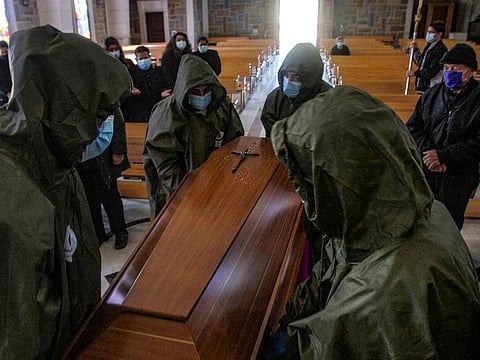Why many countries failed the COVID-19 test
Governments need to plan and can no longer pretend to have been taken by surprise, again

Lebanon has lost to coronavirus in two days the same number of lives the country lost in last year’s catastrophic explosion at the Beirut port, which caused a global outcry and emergency help from dozens of countries, including makeshift hospitals, medical kits and staff and significant financial and food aid.
Lebanon has been in total lockdown for the past month, which is supposed to be eased, partially on Monday. On Thursday and Friday, 190 people died of Covid-19 complications as the health system seems to have collapsed under the increasing number of daily cases, which reached record level in the past few weeks — around 3,000 daily in a country of 6 million people.
Lebanon’s poor response to the pandemic is obviously the result of the country’s seemingly endless crises, politically and economically. To be specific, Lebanon’s problems, including the disastrous coronavirus situation are due to a failure in the system. For few years, Lebanon has been designated by many as a failed state.
Since September, the country has failed to form a new government due to the usual infighting within the political class despite the intervention of a number of countries, mainly France. The local currency lost more than 5 times its value in the past year. One American dollar is now worth almost 8,000 Lebanese pounds, the Lira. A year ago, the dollar was worth 1,500 Liras. The national debt is currently estimated at $80 billion — equivalent to 170 per cent of the GDP.
This is exactly why Lebanon cannot handle the pandemic and its death rate is one of the highest in the world. Lebanon, nevertheless, is one of a number of countries that failed the test of Covid-19.
Unprepared health systems
Over a quarter of world’s total coronavirus cases are in Latin America and the Caribbean region, according to a study by the North American Observatory on Health Systems and Policies (NAO) institute. More importantly, that region accounts for a third of the world’s total deaths.
The study says that “contextual factors such as fragmented health systems, limited social safety nets, and high levels of informal employment and inequality” have hindered the ability of those countries to deal with the pandemic. The failure in those critical areas, in addition to the absence of vaccine and consistent antivirus policies, overwhelmed unprepared health systems in those countries.
Moving to supposedly more developed countries, one can find nearly a similar human impact of the pandemic. The UK comes in the top five countries in the number of Covid-19 deaths with over 110,000 fatalities, a staggering number for a country of 68 million people. Moreover, when it comes to the death rate per capita, the UK is actually the worst in the world — 1,619 deaths per one million!
Two weeks ago, London mayor Sadiq Khan declared the coronavirus situation in the city a “major incident” as the National Health Service hospitals and medical professionals struggled to cope with the increasing number of infections and deaths. The Guardian newspaper wrote that hospitals in the UK were “so overwhelmed with Covid-19” that the government transferred many of them to hotels.
Lack of planning
Lebanon is a case study of a failed state unable to deal with a major crisis such as the pandemic. Latin America is an example of the inefficiency of a state structure. Meanwhile, a developed country like the UK is an example of the lack of adequate pre-planning to deal with such crisis.
On the other hand, there are countries that have managed to be on top of the world rank in all of those fronts in dealing with the unprecedented pandemic. Let us take the UAE as example. As of Saturday, the country has become the top country in the world in daily vaccine doses administered per 100 people — every day the UAE vaccinates 1.4 per cent of its total population. In total, more than 4 million people have already been vaccinated of a country of 9 million. That is both, efficiency and planning.
UAE — an example of efficiency
For several years, UAE leaders talked about preparing the country for the next 50 years. Their vision is based on a country that is self- sufficient, independent of oil revenues, technologically advanced with a solid modern state structure in all facets — education, rule of the law, health and economy.
The coronavirus was a major test of that vision and the UAE came out swinging. Its response to the pandemic is often cited globally as an example of efficiency and caring.
One example is the Red Crescent’s sponsorship of the families of those citizens and expatriates who died because of Covid-19. The coronavirus challenge is a wake-up call for the world. Experts are already talking about a worse wave in the waiting.
Others talk about other types of crises awaiting humanity in the next decade, mainly due to climate change. Countries need to plan. They can no longer pretend to have been taken by surprise, again. Unless that country is Lebanon. Then, in my opinion, it is a hopeless case.


